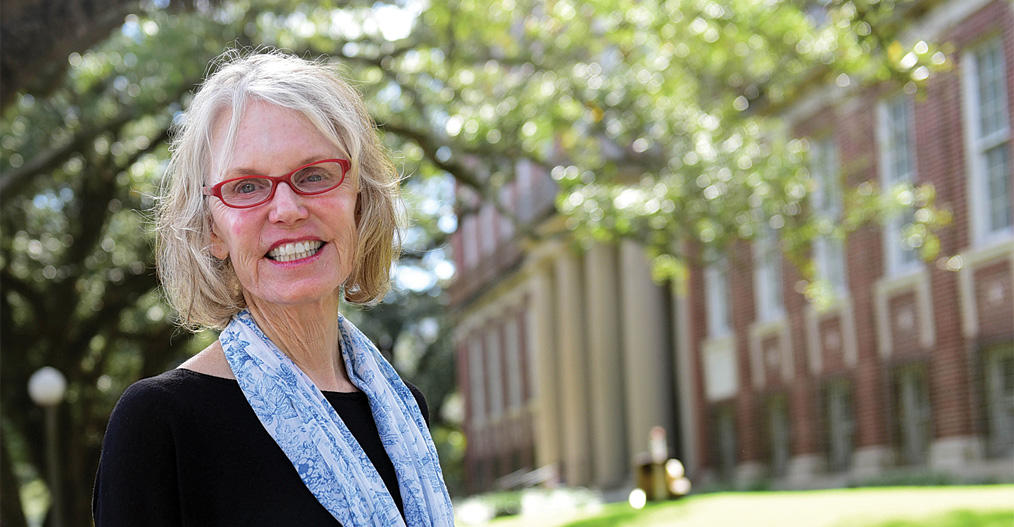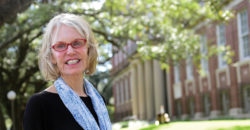Magazine
Taking Care of History
The longtime archivist and editor is this year's LEH Lifetime Achievement awardee
Published: March 8, 2017
Last Updated: September 14, 2020

Photo by Cheryl Gerber.
Author and archivist Susan Tucker.
That broad range of interests and her urge to help researchers are defining characteristics of this year’s recipient of the Louisiana Endowment for the Humanities Award for Lifetime Contribution to the Humanities. Susan Tucker loves guiding scholars to good source material, helping them find answers. Along the way, she’s become a scholar herself, making enduring contributions in many different fields.
Tucker first came to New Orleans from her native Mobile to study history at Newcomb College as an undergraduate in the 1960s, then returned to stay. The creation of the Newcomb Archives was the work of nearly three decades, from 1988 to Tucker’s retirement in 2015. Along the way she pursued a doctorate in archival studies at the University of Amsterdam.
Much of her work involves the gentle care of written records, often old or fragile, honoring the human touch behind each one. It was not uncommon to find her carefully paging through a cookbook in the Culinary History Collection, or pulling on white cotton gloves to show a visitor a Newcomb College alumna’s scrapbook. Respect for the way the ordinary illuminates the greater picture of life as we live it is a hallmark of her work.
“My biggest efforts went to helping scholars find out about the details of lives.”
“My biggest efforts went to helping scholars find out about the details of lives,” she said. “I always think that is what we, as humans, are hungry for — the stories, yes, but within those true stories, especially, those from real lives documented on paper or elsewhere— the very particulars that shape how one gets up every day and goes about one’s work. I was always interested in women’s lives mainly because there was less information on these details… I think care is a pivotal word in archives, and indeed in history.”
Knowledge of place and people followed. “I loved getting to know the college, then the university, then the city,” Tucker said. “To know the Newcomb pottery decorators, the women who founded Newcomb Nursery School (and the teachers who followed and then founded nursery schools and day cares all over the city), the seamstresses and Carnival designers who came out of the same tradition as Newcomb art school, the reformers who made the women’s movement — it always seemed as if I knew these people themselves. Archives give a sense of how what one does with purpose can live on after one dies.”
Her first book was the legendary Telling Memories Among Southern Women: Domestic Workers and their Employers in the Segregated South, which was acknowledged by novelist Kathryn Stockett for its many contributions to her 2009 bestseller, The Help.
“I am proud to have worked on the history and memories of African American female domestic workers in the 1970s and 1980s, as well as how the white women of the same period thought of domestic workers,” Tucker said. “I always said if I had known how hard that work on race and gender and place would be, I might not have begun. I often still get letters from people working on this history and they thank me. And the fact that the book is still in print makes me very happy.”
She feels like a woman in the right place at the right time. “Newcomb was an early leader, certainly an impetus for making women’s public lives fully a part of the worlds in which they live and I am thankful to have been part of that tradition,” she said. “I think feminism has encouraged me to look for what I am not seeing. For that reason, I think, I understand wide spectrums of politics, even those different from my own.”
Tucker is keenly aware of the challenges of archival work in the digital age. “Knowledge is shaped differently now with so many online resources. You need such wide knowledge of technology, and to learn to care for things electronically. The audience is changing – you never know who’s out there, and so often people take things out of context.”
The freedom of the internet – with its immediate gratification, its fragmentary nature, the way it changes reading habits — poses questions for people who have thought long and deeply about history and change. As Tucker asked, “Who will be the guardian of the deeper context?”
Susan Larson hosts “The Reading Life,” a weekly book program, on WWNO, the New Orleans NPR affiliate. She is the author of The Booklover’s Guide to New Orleans (LSU Press). She was the book review editor at The New Orleans Times-Picayune from 1988-2009, and has twice chaired the jury for the Pulitzer Prize in Fiction.
